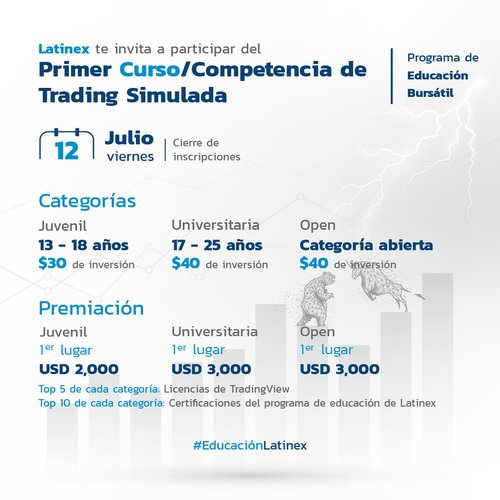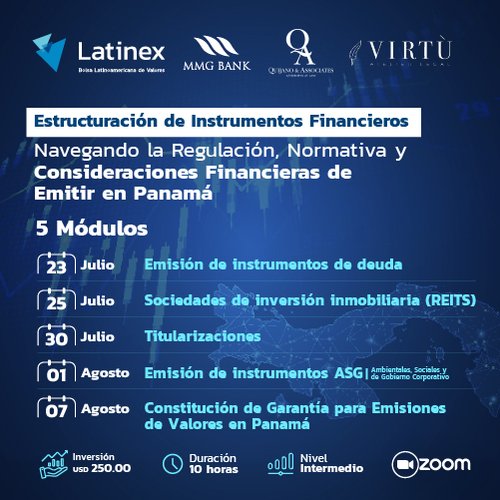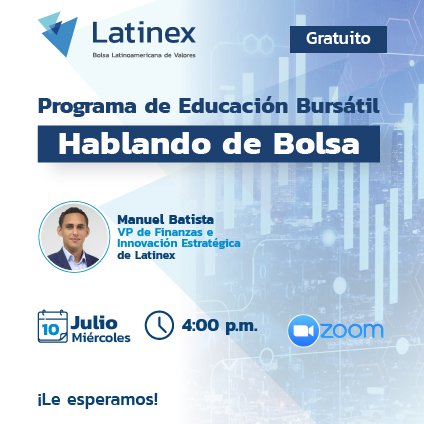Education
Education
Trainings
Latinex, in its capacity as the managing entity of the Panamanian capital market, is committed to promoting financial and stock market culture in Panama. For this reason, we created the Latinex Education Program, whose activity is the organization of training initiatives linked to the markets under the motto “With the Stock Market You Learn about the Stock Market.”
-
Simulated Trading Course/Competition
For the first time in Panama, Latinex, through its Stock Market Education Program , will be organizing a Simulated Trading Course/Competition .
In addition to the competition, we will offer several course modules designed to guide and teach on the topic, giving you the tools necessary to excel in the world of trading. The competition will be held in a simulation environment using play money.
This event will allow university students and young professionals to compete against each other within a trading simulation environment, applying investment strategies, critical thinking and the practical application of financial concepts.

Addressed to:
This competition is aimed at young people from schools, universities and the general public.
Goals:
Promote the stock market culture of Panama
Raise awareness about the importance of financial education in Panama
Train university students and young professionals on the capital markets
Deadline:
12th of July
Investment:
USD 30.00 and 40.00
To download the document in PDF format, please click on the corresponding link.
-
Seminar on Structuring of Financial Instruments
This seminar seeks to provide participants with a complete understanding of the process of Structuring, Registration and Listing of financial instruments in the Capital Markets of Panama, including its participants, regulation, types of structures and their operational considerations.

Addressed to:
This seminar is designed for executives, managers and professionals in areas of law, finance, treasury, as well as supervisory authorities, auditors and academics.
Acquired skills:
1. In-depth knowledge of the Capital Markets of Panama and their regulatory and normative functioning
2. Acquisition of practical skills to structure public broadcasts
3. Development of a solid foundation to explore financing opportunities in the Panamanian market
Start date:
July 23th
Investment:
US$250
To download the document in PDF format, please click on the corresponding link.
-
Talking about the Stock Market
This program is designed especially for those without prior knowledge of the stock market. Through our training, participants will acquire the basic skills and knowledge necessary to understand how the stock market works.

Addressed to:
It is designed especially for those who have no prior knowledge of the stock market and want to acquire the basic skills and knowledge to get started.
Acquired Skills:
1. The fundamental concepts and terms of the stock market.
2. How stock markets work and what role they play in the economy.
3. Introduction to buying and selling shares.
4. Basic strategies to invest in an informed and safe way.
Training date:
July 10 at 4:00 pm via Zoom
Investment:
Free
Frequent questions
-
What is Latinex?
The Latin American Stock Exchange, SA (Latinex) is an organized securities market where buyers and sellers of value come to carry out their exchanges under an environment of transparency and equity.
-
What is the process to invest in Latinex?
The investment process through Latinex must be carried out through a series of steps such as:
- Contact a Latinex member Stock Exchange where the investor will express his or her requirements and the Stock Exchange, through the investment advisor, will explain the different alternatives that the market offers, establishing in advance the needs and costs that will be incurred.
- After receiving advice from the Investment Advisor, the investor makes a decision, which is communicated to the Authorized Broker who will carry out the transaction at Latinex.
- The Broker proceeds to place the orders in the trading system.
- If the transaction is executed, on the third business day after the transaction, the Stock Exchange that represented the investor who sold the securities will receive the funds resulting from said sale, likewise, the Stock Exchange that represented the buyer will receive the securities.
- The investor must follow up on his investment, that is, monitor the trading prices of said security, the financial evolution of the issuer and relevant facts related to the issuer.
-
How is a transaction carried out on Latinex?
Transactions carried out through Latinex can only be executed by officials of the Stock Exchange Posts, these officials are known as Value Brokers and must be previously authorized to perform these functions.
Latinex uses an electronic transaction system which allows stock market transactions to be carried out quickly and systematically in real time. These transactions are carried out from Monday to Friday from 10:00 AM to 3:00 PM. In addition, the clearing and settlement services for stock market operations carried out through Latinex are carried out through electronic systems provided by Central Latinoamericana de Valores (Latinclear), thus allowing the elimination of risk in operations and inefficiencies in settlement. and compensation that were previously done manually.
-
What is the stock market and who is part of it?
The stock market is nothing more than a mechanism, part of the financial system, to which buyers and sellers freely converge to carry out exchanges which are carried out through the issuance and negotiation of securities.
The stock market is made up of the primary market and the secondary market. The primary market is where new instruments are placed while the secondary market is where previously placed securities are traded.
The participants in the securities market are the issuers that raise resources through this market, the investors who seek different investment alternatives, and securities brokers and intermediaries, among others. -
What is a value?
A security is an instrument or certificate issued by natural or legal persons that certifies the obligation that it has contracted with its holder. Depending on who issues these instruments, these can be corporate securities, that is, issued by private companies, or public sector securities which are issued by the state or one of its agencies.
Likewise, securities can represent participation in the capital of a company, such as shares or a debt owed to their holders.
-
What is traded in the stock market?
In a stock market, capital instruments such as common shares, preferred shares, and fund shares are traded. As well as debt instruments such as negotiable commercial securities, treasury bills and notes, corporate bonds, mortgage bonds, agricultural bonds, agro-industrial bonds, tourist bonds, forest bonds, and state bonds, among others. In addition to all instruments that meet the requirements to become a security.
-
Who and how is the stock market regulated?
The stock market is regulated by the Superintendence of the Stock Market through the powers conferred on it by Decree Law 1 of July 8, 1999.
-
What are Brokerage Houses?
Brokerage Houses are companies specialized in securities intermediation. These companies must comply with administrative, technical, financial and legal requirements, demonstrate experience in stock market matters and have authorization from the Superintendency of the Stock Market to carry out these operations. The Bag Stalls They are those Brokerage Houses that have the right to negotiate within a stock exchange.
-
Who are Securities Brokers and what are the requirements to be a Securities Broker?
A broker-dealer is any natural person (other than a broker-dealer) who solicits or makes purchases or sales of securities on behalf of a broker-dealer:
- The requirements demanded by the Superintendence of the Stock Market (SMV) to be a securities broker are the following:
- Have a securities broker's license granted by the SMV.
- Pass exams on the content of Decree Law July 1, 1999 and its regulations, as well as on the uses and customs of the stock market industry, on the rules of self-regulated organizations authorized to operate in the Republic of Panama, on general accounting principles and finance and on ethical standards of the securities industry. The exam is offered by the SMV, for dates and study guides go to www.supervalores.gob.pa
- Not having been convicted in the Republic of Panama, or in a foreign jurisdiction, for crimes against property, for crimes against public faith, for crimes related to money laundering, for crimes against the inviolability of secrecy, for the preparation of states false financial statements or who have not been convicted of any other crime that carries a prison sentence of one or more years.
- That you have not had, in the last five years in the Republic of Panama or in a foreign jurisdiction, revoked an authorization or license necessary to function as a member of a self-regulated organization, such as a brokerage house, as an investment advisor, as an investment manager, as a senior executive, as a securities broker or as an analyst.
- Not having been declared bankrupt.
-
What are the steps to negotiate a security on Latinex?
To issue securities through Latinex, Issuers must comply with the following steps:
- Coordinate the terms and conditions of the structuring with the Financial Advisor.
- Complete the registration requirements in Latinex de Valores.
- Obtain the relevant authorization from the Securities Market Superintendency.
- Comply with the requirements of the Central Securities Custody.
- Distribution of the Information Prospectus and announce the terms of the offer in the media.
- Initiate the placement in the Primary Market through Latinex de Valores through a Stock Market Stand.
- Once a security is registered in Latinex, the issuer must comply with the disclosure requirements and Rules of Procedure from Latinex.
- The activities within Latinex are examined, supervised and audited by the SMV.
-
What is a risk rating?
A risk rating is an evaluation that is made in order to determine the solvency of the entity, that is, the ability to respond to its obligations.
The evaluation is carried out based on an analysis of the company's public information and that provided voluntarily. It also includes meetings with the entity's main executives.
To evaluate the solvency of the issuer, the rating agency studies the risk of the industry where the company is located, its competitive position and its financial situation. Finally, we must point out that the risk rating is a professional and impartial opinion on the probability of default of an obligation that does not represent an investment recommendation.
-
What should an investor keep in mind when investing?
Many people see the act of investing in the stock market as a game of chance, investment should be seen as a serious process in which many variables come into play which must be considered before delving into them:
- Investment Objectives: Investment is a means to achieve certain ends. The most common purposes are accumulation of capital to achieve certain personal objectives, to receive periodic income, to diversify existing investments or simply to speculate in securities. This definition of objectives is essential in the appropriate selection of securities and in determining the return criteria and monitoring of investments. First of all, define your investment objectives.
- Risk tolerance: Any act that involves acting now to receive future benefits carries the risk of whether or not those future benefits will occur. Investments are par excellence vehicles where you pay now to receive future benefits and therefore always have an element of risk. Not all people have the same risk tolerance nor do they have the financial resources to face the possible losses caused by a bad investment. Not all people are of age or in personal economic condition to take the same risks. Comparing investment needs with the risks to be taken is essential to determine investment instruments and horizons.
- Information availability: Investing is not a guessing game. On the contrary, good investment decisions are made with information; The more, the better. Usually securities issues and the companies that issue them provide the public with a lot of information, but it is not always clear and reliable. An important aspect in the availability of information is to investigate whether the securities are registered in organized markets and whether the issuers are subject to regulatory standards. These two aspects normally mean that issuers are required to provide an acceptable standard of information. Another important aspect is to see if the values are followed or monitored by analysts, risk rating agencies or Brokerage Firms, in which case there may be frequent diagnoses about the value and the company that can guide the investor.
- Liquidity Considerations: Investors should always consider the eventuality that they may have to exit an investment due to necessity or convenience. In that case, it is necessary to know in advance the liquidity of your investment, that is, how quickly the investment can be converted into cash, with the minimum impairment in its value. Not all investments are liquid and not all have the same ability to convert into money. Always prefer investments that have an active market such as a Stock Market or investments that have implicit liquidity clauses or mechanisms.
- Custody and settlement of investments: Many investments are not lost in the market but behind the scenes. Securities poorly kept or in the hands of unscrupulous custodians often result in disorder and theft that harms the investor. Try to store your securities as if they were cash and put them in the hands of professional custodians or depositories like Latinclear.
- Ability to follow up: One does not invest and forget about the investment. Investments reflect dynamic real-life situations and their returns may be changing. Investing is an active discipline that, like exercise, requires monitoring and attention. If you cannot provide the follow-up that an investment requires, hire someone who can do it for you.
- To diversify: Every investment carries risks. Risks cannot be eliminated, but they can be greatly reduced. The best way to reduce risks is to follow the old maxim of “don't put your eggs in one basket.” Thus, when investing, try to acquire investments of different types, from different issuers and hopefully from different jurisdictions, thereby reducing the risks inherent to a single issuer, a single country and the economic phenomena that affect securities differently.
Subscription
Stay informed of the latest news and developments in the stock market.
Data Protection
The personal data provided will be processed by Grupo Latinex (made up of the companies Latinex, Holdings, Inc., Latinex Capital, Inc., Bolsa Latineamericana de Valores, SA and Central Latinoamericana de Valores, SA) in accordance with the Data Protection Policy Personal, published at: www.latinexholdings.com, www.latinexbolsa.com and www.latinexcentral.com